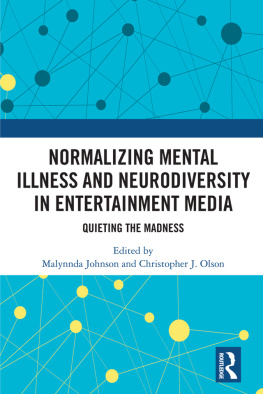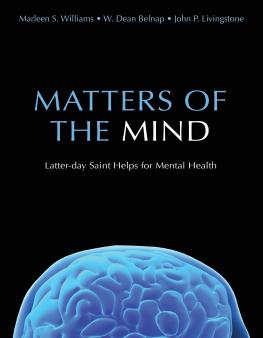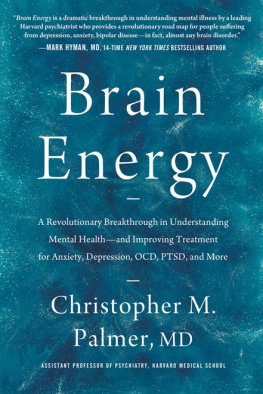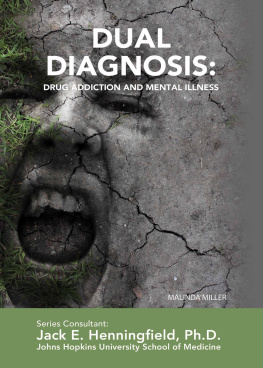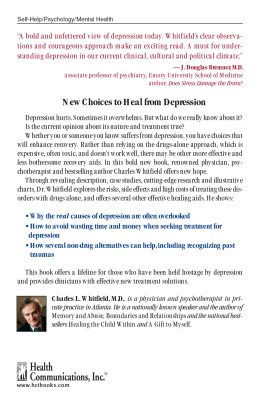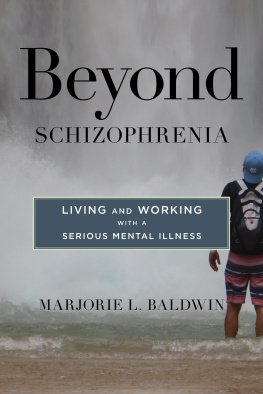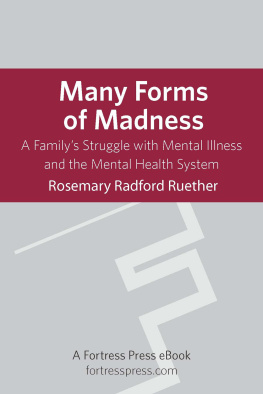
Published by Black Inc.,
an imprint of Schwartz Publishing Pty Ltd
Level 1, 221 Drummond Street
Carlton VIC 3053, Australia
www.blackincbooks.com
Copyright Steve Ellen and Catherine Deveny 2018
Steve Ellen and Catherine Deveny assert their right to be known as the authors of this work.
This publication contains the opinions and ideas of the authors and offers general advice only. It is not intended as and should not be relied upon as professional medical advice.
ALL RIGHTS RESERVED.
No part of this publication may be reproduced, stored in a retrieval system, or transmitted in any form by any means electronic, mechanical, photocopying, recording or otherwise without the prior consent of the publishers.
9781863959537 (paperback)
9781925435719 (ebook)

Cover and text design by Tristan Main
Personality disorder cartoon p. 185 Michael Leunig
INTRODUCTION
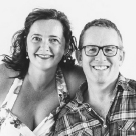
Perhaps we should begin by introducing ourselves.
Im Steve, a psychiatrist who has been working as a clinician for the past twenty-eight years. Ive worked mainly in general hospitals helping people with medical and surgical problems this includes pretty much everything: overdoses; depression; anxiety; eating disorders; schizophrenia; coping with trauma and illnesses, including cancer, HIV/AIDS and transplants; and anything else that might bring a person to a hospital. I also do a little research and teaching, and am a professor at the University of Melbourne. About fifteen years ago I developed an interest in health communication and since then have worked in radio, print and TV. I also suffered depression for about a year, and this helped inspire the writing of this book.
And Im Dev, a writer, comedian, social commentator and public speaker. Ive experienced lots of mental health problems and treatments and developed a strong sense of what does and doesnt work for me. Im grateful for the help Ive received, but also concerned that getting the right help is not as easy as many people think. Also, I believe the things you do yourself and the help you get from the people you love are probably more important than all the drugs and therapy in the world. Figuring out the right formula is the real challenge.
Were both really passionate about mental health. We know what its like to suffer from mental health issues, and how hard it is to find good, clear advice. So we wanted to put everything you need to know into one book. We were keen to make it a cracking read but also a valuable reference.
Mental is for people living with a mental illness, people with loved ones who might have a mental illness, and the curious amateur shrinks. Its also a guide for people who come into contact with the mentally ill but feel underprepared lawyers, the media, teachers, carers, whoever.
We hope to increase understanding, reduce stigma, and provide an accessible and readable book that covers the length and breadth of the field. Our aim is to explain mental illness in a way that is easy to understand for the intelligent layperson. No prior knowledge is required. Weve tried to give both a birds-eye view and a peek under the bonnet. Weve included the latest medical information, but weve also provided reflections on the cultural and political context of mental health care.
By reading Mental, we hope youll learn about mental health, youll think about yourself and others, youll know what to do if life goes wrong, and youll be inspired to seek out more information. We want this to be the beginning of a conversation, not the end. Weve researched the information well, but not exhaustively. And weve tried to give you quality perspectives and opinion in a field where disagreement and dissent is the norm without boring you senseless with endless debate.
More than anything, Mental is not a replacement for face-to-face help. You cannot treat yourself just with this book. But it will give you the latest knowledge and understanding in a field that is endlessly fascinating and constantly evolving.
We hope you enjoy reading Mental as much as we enjoyed writing it.
Steve Ellen
Catherine Deveny (Dev)
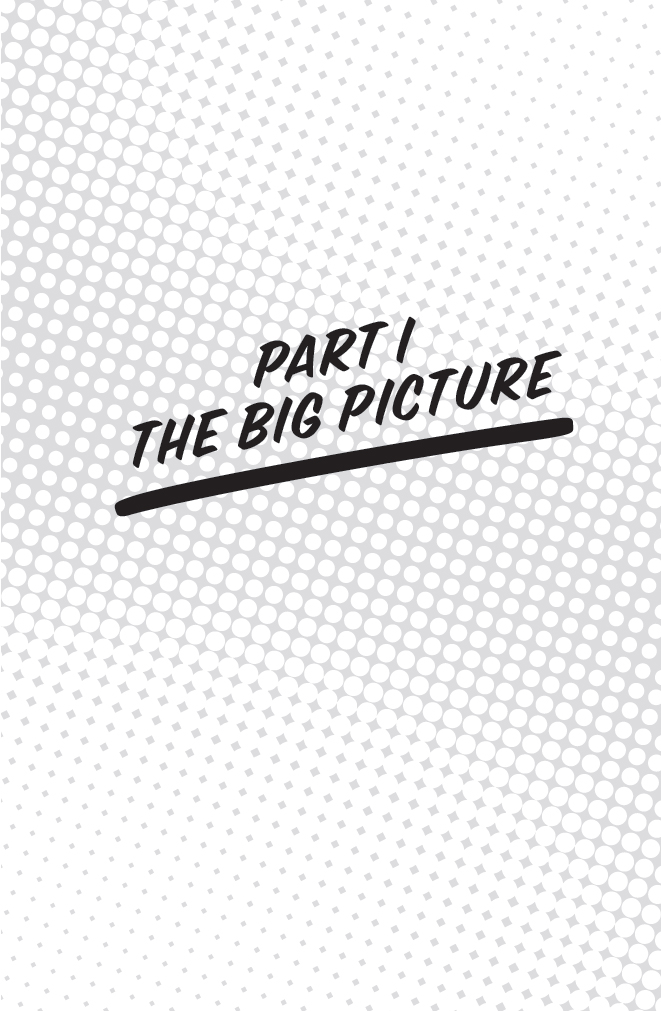
WHAT IS MENTAL ILLNESS?
H ow do we define mental illness? Well, theres a short answer and a long answer.
The short answer is that a mental illness is any problem with your emotions, behaviour or thinking that affects the way you function to a degree that worries you. Or, as the Australian Department of Health defines it: A mental illness is a health problem that significantly affects how a person feels, thinks, behaves, and interacts with other people.
If thats enough for you, skip the rest of this chapter and have a cuppa instead. If not, read on!
The long definition of mental illness and definitions of all the disorders that fall under its umbrella is provided in large classification manuals, the most popular being the DSM the Diagnostic and Statistical Manual of Mental Disorders. Remember that name: youll hear it often in the field of mental health.
Classification manuals get updated pretty regularly and there is always much debate around them. It is worthwhile knowing a little about how definitions and classification work, as they are the foundations upon which diagnosis and treatment lies.
Definitions in health care determine who gets help; who gets paid how much; and who gets all the benefits of sickness, such as time off work and sympathy. They also tell governments where to spend their health dollars. If you understand how these definitions work, psychiatry will make a lot more sense.
Diagnosis
Diagnosis can set you free; it can be liberating. It can provide clarity, it can be a relief an aha moment not just for you, but for everyone around you too. Dev discovered she was dyslexic when she was thirty-eight it was a missing part of her puzzle. She says: Finding out I was dyslexic was a triumph for the eight-year-old me who was constantly told she wasnt trying hard enough to learn her times tables or remember how to spell.
But theres a downside to diagnosis too: it can be limiting. Having a label can make others prejudiced towards you. They may treat you unfairly or discriminate against you. It can also lower your expectations of yourself if you take it as an excuse not to live up to your full potential.
People with disabilities carry the soft burden of low expectations.
Graeme Innes (Australias disability discrimination commissioner 20052014)
Finally, when diagnosis is used in an accusatory fashion, it can be used to stereotype people. For instance, someone might say: You dont want to travel with someone who is bipolar theyll be unreliable and unpredictable.
However, in most cases, diagnosis is beneficial overall it offers the potential for insight into your situation and helps you and the people around you have realistic expectations.
Classification
There are two main texts used to classify mental illnesses the DSM, as mentioned above, and the ICD (International Statistical Classification of Diseases and Related Health Problems). The ICD classifies every illness and only has one chapter on mental illness. The DSM is just about mental illnesses. Both are used by mental health clinicians, but the DSM is more popular.
Next page

